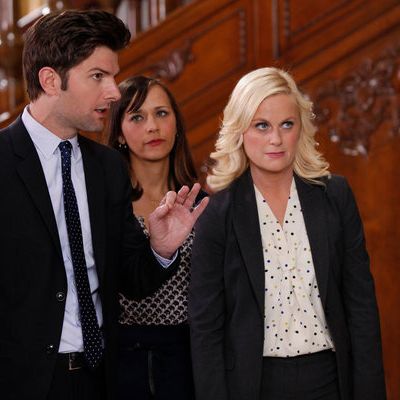
The wide-eyed political optimist who’s corrupted during their rise to power is a classic story line. If the romantic Ur-plot is “boy meets girl, boy loses girl, boy gets girl back,” then the political version is “hero gains power, hero loses self, everything rapidly goes downhill.” It’s an appealing trajectory because it speaks to our cynicism about politics, as well as our ambivalence about ambition.
Parks and Rec has been flirting with this story all season long. Not embracing it, mind you, but repeatedly considering it, trying it out, rejecting it, and then circling back around for one more go.
Leslie is our optimist, which makes Ben her sexy hummingbird of a Lady Macbeth, constantly pushing her to think more like a political tactician. Sometimes, Ben’s experience and realism are assets to the Knope campaign; last night, they were not. When a reporter asks Leslie for a comment on Nick Newport, father of her spoiled rival Bobby Newport, you can see Ben’s training in her swift, decisive response: She calls him a jerk and backs up the insult with facts. This should be a good move! Except that the reporter actually wanted a comment on the fact that Nick Newport just died.
Leslie’s newfound political skills don’t offer much help here. First she stammers, “I … sad,” then goes right back to her stump speech: “That is overall a bummer. And together we can build a better Pawnee.” Unfortunately, that’s the cue for the Knope campaign’s dancers. Those are T-shirt cannons of mourning, people.
Bobby’s campaign manager Jen calls for Leslie to suspend campaigning. To keep going would be classless, like spray-painting nipples on the Lincoln Memorial. This is where Ben’s instincts fail him. He thinks they can milk the situation for political capital, so he sets up a ten-minute apology meeting at the Newport manse. Sweet, non-political Ann, on the other hand, thinks Leslie should drop the campaign and apologize for real.
Ann’s right, of course. When the tour bus pulls up so that Leslie can make her faux-pology, there’s a memorial in progress and a phalanx of press in attendance. Leslie’s been set up! As the SS Knope tries to book it out of there, the bus crushes a portrait of Nick Newport. Even Leslie’s classy “Sorry for Your Loss” fruit basket (“no melon, no apples”) won’t get her out of this one.
So far, this all matches the trope pretty well. Leslie knows that talking to Bobby is the decent thing to do, but she’s acting out of political expediency instead of basic human goodness. Jen even says, in case anyone missed the point, that she only turned the occasion into politics because that’s what Leslie was going to do.
But here’s where the connection starts to fray, because nobody wants to see Leslie punished for her choices. The thing is, Parks and Rec isn’t anti-ambition. Leslie’s overpowering drive is played for laughs, but it’s never depicted as a genuine character flaw. It’s not supposed to make her dislikable. And more important, Parks and Rec isn’t cynical. It mocks local politics, but there’s a deep faith in human nature guiding this show. Everyone’s basically a good person, even the bad guys. Given the morals here, you could feel comfortable watching it with an 8-year-old, even if you’d have trouble explaining why Chris Trager disappeared with that lady who kept talking about bedrooms.
Chris is a perfect example of the show’s inherent kindness. Can you imagine how annoying he would be as your boss? And yet the show is so tolerant of his quirks. On a meaner series, another character would have said that line about how Chris has got a deep inner hole that he’s trying to fill with work and exercise, and it would have been a putdown. Having it come from Chris himself softens the blow and makes you feel for him. He’s not self-aware, exactly, but he’s so close. The show does wring comedy from his descent into a dark, dark place: “First of all, dark places are awesome” was classic April Ludgate (excuse me, April Ludgate-Dwyer.) But it’s still basically sympathetic to his plight.
Bobby Newport is an even better example. There are plenty of topical reasons why a TV show might present us with a dumb, friendly political bro and then ask us to resent him. He’s a mini-W, a one percenter. But by casting Paul Rudd, who’s lovable even when he’s being a dick, the show undercuts any residual nastiness in Newport. When Leslie goes to apologize for real, on Ann’s counsel, she finds Bobby playing Wii bowling. He’s not a monster, he’s a man-child, and he looks incredibly boyish when he tells her that he only joined the campaign to impress his dad — as well as a little later, during a press conference, when he steals Leslie’s story about joining the track team.
It’s a ratlike move, but Bobby immediately makes up for it by pulling Leslie up onstage and calling her supportive, not to mention “megacool.” They talked person to person, he says, and if people don’t vote for him tomorrow, they should vote for her. Maybe Bobby’s so dumb he doesn’t realize that he just blew his advantage. But maybe he’s just not interested in trying to crush anybody. Maybe he’s just being nice.
Niceness pretty much always wins in Pawnee, but not always. Sometimes you run across people like Bill, the surly owner of a flight of vans that Leslie rented to ferry senior citizens to the polls. Bill has decided to hold the vans hostage after the Newport campaign paid him $10,000, and nothing’s going to change his mind. Tom Haverford’s offer to let him in on the ground floor of his gourmet alcoholic yogurt company, Yogurt Platinum, doesn’t sway him. Neither does Ron Swanson’s steely resolve, or his matching offer.
Team Knope is driving away in failure when Bill accidentally rear-ends Donna’s Benz. So Donna backs up, smashes his car, and points out that she has witnesses who will say he caused all the damage if he doesn’t relinquish the vans. Let’s take a moment to appreciate what just happened here: Donna sacrificed her Benz, the thing she loves most in the world, for Leslie Knope. Instead of pulling Leslie away from her co-workers, this campaign has just brought them closer.
Also, quickly: Burt Macklin’s back and he’s solving pie crime! This subplot introduced us to Andy’s list of code names, which doubles as a rundown of his sexual feelings for all of his co-workers. (Donna’s “It happened once in a dream,” to which she winks knowingly.) But the pie thing really happened for just one reason: so that we could watch Andy slowly rub whipped cream all over Jerry’s head. Even on the nicest sitcom in television, in the nicest town in Indiana, nothing beats a good old-fashioned pie in the face.


